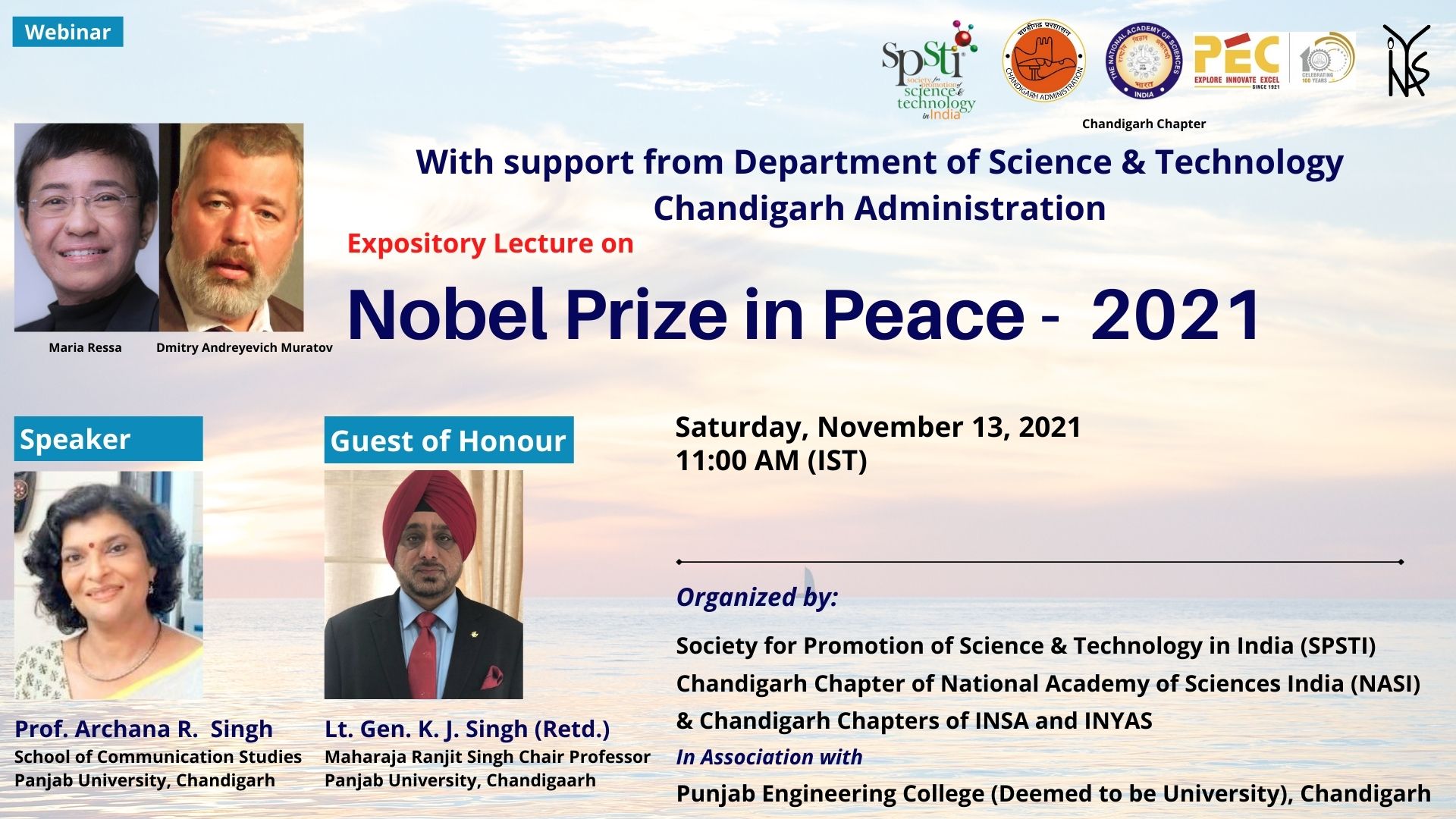Lecture on Nobel Prize for Peace 2021
The Nobel Committee recently announced that the Prize in Peace for the year 2021 is to be jointly awarded to Maria Ressa and Dmitry Andreyevich Muratov, “for their efforts to safeguard freedom of expression, which is a precondition for democracy and lasting peace”.
The Society for Promotion of Science & Technology in India (SPSTI) with support from Department of Science and Technology, Chandigarh Administration and in association with Chandigarh Chapters of National Academy of Sciences India, Indian National Science Academy & Indian National Young Academy of Sciences and Punjab Engineering College (PEC) (Deemed to be University), Chandigarh organized a webinar on the topic on Saturday, November 13, 2021 at 11.00 am. It was the third expository lecture in the series for 2021 and will be concluded on 9th Dec., before the prizes are ceremoniously awarded in Stockholm.
Prof. Keya Dharamvir, General Secretary steered the session, welcomed all and presented the opening remarks. Prof. Arun K. Grover, former Vice Chancellor of Panjab University & Vice President of SPSTI gave a brief introduction of Nobel Peace Prize. Dr. Mahak Sharma, member of INYAS, introduced the Guest of Honor was Lt. Gen. K.J. Singh (Retd.), Maharaja Ranjit Singh Chair, Professor, Panjab University, Chandigarh. Lt. Gen. K.J. Singh said to be a vishwagurus we need to promote an ecosystem and recognize the excellence. The society needs to know of science and technology and its recognition adds to progress and development in world.
Dr. Nishima Wangoo, member of INYAS, introduced the speaker Prof. Archana R. Singh, School of Communication Studies, Panjab University, Chandigarh. She began with a brief introduction of the work by Maria Ressa and Dmitry Andreyevich Muratov. Her lecture focused on ‘free, independent and fact-based journalism’ which are ideals of journalism. She says these words though are easy to understand but have tough challenges. She explained the ‘freedom’ as ascribed in our constitution, but also mentioned that that these rights have restrictions or limitations, that should not affect the security of the State, friendly relations with foreign States, public order, decency or morality, or in relation to contempt of court, defamation or incitement to an offense. She said as a country, we began as a rebellious industry, being agenda and ideology driven and aggressive in our approach as all nationalist leader were in government, so press would act as ‘constructive opposition’.
She also touched upon the role of the media. Is it an altruistic entity devoted to providing unlimited factual information and demystifying facts and serving the society through news and views, or is it a business entity that works for financial gains? Or is it both? Are media person for social service, or are they professionals working for large corporations aiming at a good salary package? She added that it is a business with a mission. It requires selfless passion, tenacity of purpose and dedicated, unrelenting results. She also talked about the impact of market trend on media.
She also talked about newspaper which requires a tenacious approach that should offer easier readability, clarity and visibility of information. She focused of bringing out the factual information as a task by quoting Lippmann “true opinion can prevail only if the facts to which they refer are known; if they are not known, false ideas are just as effective as true ones, if not a little more effective”. She talks how sensationalizing a news fetches more audience and truth has its social constructions based on language, unreliability of memory, perceptions based on experiences, desires and expectations. She also elaborated how a news story depends on audience demand, technical demands where camera determines what we see and the medium actually becomes the message, scheduling, stereotype, constructed reality of news and its dramatization.
She also talked about social media where India is one of the largest consumers. She says the line between the content creator and user have been blurred. The resulting freedom to express has led to democratization of social media such that absurdity and profundity fact and fabrication have equal rights and spaces on social media. Social media is good for creating awareness, but the real political change requires actual decision making, which takes time and reflection. She also brings the focus on “I loop” created by algorithm making one enslaved of their own preferences and deprived of new experiences.
She concluded her lecture saying media education is now necessary to understand the constant inflow of information. Moving from industrial age to information age has overloaded us with the information, making media literacy necessary to be able to make meaning of what we see or hear, rather than letting the mediums control our thinking. She ended by quoting “Doctors bury their mistakes; lawyers hang them but journalists put them on the front page.” So, when you read your front pages, just give a thought to what goes on behind the scenes at the free independent fact-based journalism that you hold in your hand.
The lecture was attended by large number of participants on Zoom and many others through live streams of the Society on Facebook. The concluding remarks and vote of thanks was presented by Shri Dharam Vir, IAS (Retd.) and former Chief Secretary of Haryana and President of SPSTI.

